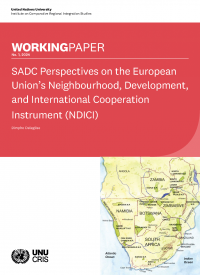SADC Perspectives on the European Union’s Neighbourhood, Development, and International Cooperation Instrument (NDICI)

The European Union (EU) is a major sponsor of African regional organisations (AROs) integration and peace and security programmes. Analysts generally agree that this relationship is defined by power asymmetries and is characterised by a distribution of resources and capabilities across issue areas that mostly favour the EU. However, most research focuses on EU policy preferences, portraying AROs as passive recipients of external assistance with limited scope to negotiate more favourable terms. On the other hand, official narratives downplay the complexities and politicisation of financial negotiation procedures, as well as the negative perceptions and concerns of recipient organisations. This highlights the need to conduct focused research about how AROs perceive and negotiate important EU agreements. In this paper, I focus on the perspectives of the Southern African Development Community (SADC) on the EU’s new funding instrument for external cooperation, the Neighbourhood, Development, and International Cooperation Instrument (NDICI), adopted in 2021. I draw attention to SADC’s efforts to develop a common position on this instrument, highlighting the complexities that can arise when bilateral and regional financing arrangements are negotiated concurrently. However, I argue that for the EU to support efforts towards a more equitable partnership, as initially envisaged under its new development cooperation arrangements, these concerns matter, and should be carefully considered.
